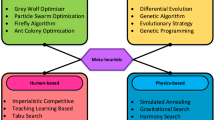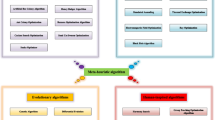Abstract
Artificial neural network (ANN) is modeled to predict and classify problems. However, in the training phase of ANNs discovering faultless values of the weights of a network is extremely troublesome. Traditional weight updating methods often get stuck into local optima and converge to optimal solutions very slowly. Therefore, to overcome these drawbacks a modified version of a nature-based algorithm which merges meta-heuristics with weight-updating technique of ANN has been used in this paper. Whale optimization algorithm (WOA) is a well-established, efficient and competitive algorithm inspired by the hunting mechanism of the whales including their behavior in finding and attacking their prey with their bubble-net feeding technique. In WOA, the next location of the search individuals or whales is modified depending on some probability. Due to the high exploration rate of WOA, there is a disproportion between exploration and exploitation in the WOA and it also converges to the solution slowly. Thus, to establish an equilibrium between exploration and exploitation a new variant of WOA called modified whale optimization algorithm (MWOA) is proposed to overcome the problem of delayed convergence. In MWOA, roulette wheel selection is combined with WOA to enhance the convergence speed of WOA. MWOA is tested on 11 benchmark functions, and the outcomes are compared with WOA. The results prove that MWOA has gained success in overcoming the problem of the slow convergence of WOA. Also, the results show that the proposed MWOA technique, when applied to ANN, can overcome the problems of traditional techniques and has improved the results.






Similar content being viewed by others
References
Abedinpourshotorban H, Shamsuddin SM, Beheshti Z, Jawawi DN (2016) Electromagnetic field optimization: a physics-inspired metaheuristic optimization algorithm. Swarm Evol Comput 26:8–22
Abualigah L (2020) Group search optimizer: a nature-inspired meta-heuristic optimization algorithm with its results, variants, and applications. Neural Comput Appl 33:1–24
Aljarah I, Faris H, Mirjalili S (2018) Optimizing connection weights in neural networks using the whale optimization algorithm. Soft Comput 22(1):1–15
Baluja S (1994) Population-based incremental learning: a method for integrating genetic search based function optimization and competitive learning. School of Computer Science, Carnegie Mellon University, 1994
Basheer IA, Hajmeer M (2000) Artificial neural networks: fundamentals, computing, design, and application. J Microbiol Methods 43(1):3–31
Birjandi AK, Akhyani F, Sheikh R, Sana SS (2019) Evaluation and selecting the contractor in bidding with incomplete information using MCGDM method. Soft Comput 23(20):10569–10585
Braik M, Sheta A, Arieqat, A (2008). A comparison between GAs and PSO in training ANN to model the TE chemical process reactor. In Proceedings of the AISB symposium on swarm intelligence algorithms and applications (pp. 24–30)
Chatterjee S, Sarkar S, Hore S, Dey N, Ashour AS, Balas VE (2017) Particle swarm optimization trained neural network for structural failure prediction of multistoried RC buildings. Neural Comput Appl 28(8):2005–2016
Chou JS, Pham AD (2017) Nature-inspired metaheuristic optimization in least squares support vector regression for obtaining bridge scour information. Inf Sci 399:64–80
Crepinsek M, Liu SH, Mernik M (2013) Exploration and exploitation in evolutionary algorithms: a survey. ACM Comput Surv (CSUR) 45(3):1–33
Dhiman G (2019) ESA: a hybrid bio-inspired metaheuristic optimization approach for engineering problems. Eng Comput 37:1–31
Dorigo M, Stutzle T (2019) Ant colony optimization: overview and recent advances. Handbook of metaheuristics, pp. 311–351
Erol OK, Eksin I (2006) A new optimization method: big bang-big crunch. Adv Eng Softw 37(2):106–111
Faramarzi A, Heidarinejad M, Mirjalili S, Gandomi AH (2020) Marine Predators Algorithm: a nature-inspired metaheuristic. Expert Syst Appl 152:113377
Faris H, Aljarah I, Mirjalili S (2016) Training feedforward neural networks using multi-verse optimizer for binary classification problems. Appl Intell 45(2):322–332
Formato RA (2007) Central force optimization: a new metaheuristic with applications in applied electromagnetics. Prog Electromagn Res 77:425–491
Ghasemiyeh R, Moghdani R, Sana SS (2017) A hybrid artificial neural network with metaheuristic algorithms for predicting stock price. Cybern Syst 48(4):365–392
Haseli G, Sheikh R, Sana SS (2020) Base-criterion on multi-criteria decision-making method and its applications. Int J Manag Sci Eng Manag 15(2):79–88
Jamali G, Sana SS, Moghdani R (2018) Hybrid improved cuckoo search algorithm and genetic algorithm for solving Markov-modulated demand. RAIRO-Operations Res 52(2):473–497
Kaur G, Arora S (2018) Chaotic whale optimization algorithm. J Comput Design Eng 5(3):275–284
Kaveh A, Talatahari S (2010) A novel heuristic optimization method: charged system search. Acta Mechanica 213(3):267–289
Kennedy J (2011) Encyclopedia of machine learning. Particle Swarm Optimization (pp. 760–766)
Kennedy J (2006) Swarm intelligence. Handbook of nature-inspired and innovative computing. Springer, Berlin, pp 187–219
Kim JS, Jung S (2015) Implementation of the RBF neural chip with the back-propagation algorithm for on-line learning. Appl Soft Comput 29:233–244
Kushwah R, Tapaswi S, Kumar A (2019) A detailed study on Internet connectivity schemes for mobile ad hoc network. Wireless Personal Commun 104(4):1433–1471
Lee KC, Lu PT (2020) Application of Whale Optimization Algorithm to Inverse Scattering of an Imperfect Conductor with Corners. Int J Antennas Propagation 2020:1–9
Lee JG, Senel G, Lim PK, Kim J, Hur K (2020) Octahedron sets. Ann Fuzzy Math Inform 19(3):211–238
Li S, Gong W, Yan X, Hu C, Bai D, Wang L, Gao L (2019) Parameter extraction of photovoltaic models using an improved teaching-learning-based optimization. Energy Convers Manag 186:293–305
Li H, Huang Z, Liu X, Zeng C, Zou P (2020) Multi-fidelity meta-optimization for nature inspired optimization algorithms. Appl Soft Comput 96:106619
Ling Y, Zhou Y, Luo Q (2017) Levy flight trajectory-based whale optimization algorithm for global optimization. IEEE Access 5:6168–6186
Lipowski A, Lipowska D (2012) Roulette-wheel selection via stochastic acceptance. Phys A Stat Mech Appl 391(6):2193–2196
Mafarja M, Aljarah I, Heidari AA, Faris H, Fournier-Viger P, Li X, Mirjalili S (2018) Binary dragonfly optimization for feature selection using time-varying transfer functions. Knowledge-Based Syst 161:185–204
Mareli M, Twala B (2018) An adaptive Cuckoo search algorithm for optimisation. Appl Comput Inf 14(2):107–115
Maulik U, Bandyopadhyay S (2000) Genetic algorithm-based clustering technique. Pattern Recognit 33(9):1455–1465
Mirjalili S (2019) Ant Colony Optimisation. In: Evolutionary Algorithms and Neural Networks, vol 780. pp 33–42. https://doi.org/10.1007/978-3-319-93025-1_3
Mirjalili S (2015) How effective is the Grey Wolf optimizer in training multi-layer perceptrons. Appl Intell 43(1):150–161
Mirjalili S, Lewis A (2016) The whale optimization algorithm. Adv Eng Software 95:51–67
Mirjalili S, Mirjalili SM, Lewis A (2014) Grey wolf optimizer. Advances in engineering software 69:46–61
Mohammadi-Balani A, Nayeri MD, Azar A, Taghizadeh-Yazdi M (2021) Golden eagle optimizer: a nature-inspired metaheuristic algorithm. Comput Ind Eng 152:107050
Ospina-Mateus H, Jimenez LAQ, Lopez-Valdes FJ, Garcia SB, Barrero LH, Sana SS (2021) Extraction of decision rules using genetic algorithms and simulated annealing for prediction of severity of traffic accidents by motorcyclists. J Ambient Intell Humanized comput 1–22. https://doi.org/10.1007/s12652-020-02759-5
Pandey AC, Rajpoot DS, Saraswat M (2017). Hybrid step size based cuckoo search. In 2017 Tenth International Conference on Contemporary Computing (IC3) (pp. 1–6). IEEE
Pandey AC, Rajpoot DS (2019) Spam review detection using spiral cuckoo search clustering method. Evol Intell 12(2):147–164
Pencheva T, Atanassov K, Shannon A (2009) Modelling of a roulette wheel selection operator in genetic algorithms using generalized nets. Int J Bioautomation 13(4):257–264
Rakitianskaia AS, Engelbrecht AP (2012) Training feedforward neural networks with dynamic particle swarm optimisation. Swarm Intell 6(3):233–270
Rashedi E, Nezamabadi-Pour H, Saryazdi S (2009) GSA: a gravitational search algorithm. Inf Sci 179(13):2232–2248
Sana SS, Ospina-Mateus H, Arrieta FG, Chedid JA (2019) Application of genetic algorithm to job scheduling under ergonomic constraints in manufacturing industry. J Ambient Intell Humanized Comput 10(5):2063–2090
Sanel G, Lee JG, Hur K (2020) Distance and similarity measures for octahedron sets and their application to MCGDM problems. Mathematics 8(10):1690
Sarkar BK, Sana SS, Chaudhuri K (2012) A genetic algorithm-based rule extraction system. Appl Soft Comput 12(1):238–254
Schmidhuber J (2015) Deep learning in neural networks: an overview. Neural Networks 61:85–117
Senel G (2016) A new approach to Hausdorff space theory via the soft sets. Math Problems Eng 2016:1–6. https://doi.org/10.1155/2016/2196743
Senel G (2018) The relation between soft topological space and soft ditopological space. Commun Faculty Sci Univ Ankara-series A1 Math Stat 67(2):209–219
Sharif M, Amin J, Raza M, Yasmin M, Satapathy SC (2020) An integrated design of particle swarm optimization (PSO) with fusion of features for detection of brain tumor. Pattern Recogn Letts 129:150–157
Shukla A, Pandey H M, Mehrotra D (2015) Comparative review of selection techniques in genetic algorithm. In 2015 International Conference on Futuristic Trends on Computational Analysis and Knowledge Management (ABLAZE) (pp. 515–519). IEEE
Simon D (2008) Biogeography-based optimization. IEEE Trans Evol Comput 12(6):702–713
Storn R, Price K (1997) Differential evolution a simple and efficient heuristic for global optimization over continuous spaces. J Global Optim 11(4):341–359
Takami MA, Sheikh R, Sana SS (2016) Product portfolio optimisation using teaching-learning-based optimisation algorithm: a new approach in supply chain management. Int J Syst Sci Oper Logistics 3(4):236–246
Tinkle DW, Wilbur HM, Tilley SG (1970) Evolutionary strategies in lizard reproduction. Evolution 24(1):55–74
Weimer W, Nguyen T, Le Goues C, Forrest S (2009). Automatically finding patches using genetic programming. In 31st International Conference on Software Engineering (pp. 364–374) IEEE
Wu G, Shen X, Li H, Chen H, Lin A, Suganthan PN (2018) Ensemble of differential evolution variants. Inf Sci 423:172–186
Xue Y, Jiang J, Zhao B, Ma T (2018) A self-adaptive artificial bee colony algorithm based on global best for global optimization. Soft Comput 22(9):2935–2952
Yan Z, Zhang J, Zeng J, Tang J (2021) Nature-inspired approach: an enhanced whale optimization algorithm for global optimization. Math Comput Simul 185:17–46
Yang XS (2020) Nature-inspired optimization algorithms: challenges and open problems. J Comput Sci 46:10114
Yang XS (2020) Nature-inspired optimization algorithms. Academic Press, Cambridge
Yazdani M, Jolai F (2016) Lion optimization algorithm (LOA): a nature-inspired metaheuristic algorithm. J Comput Design Eng 3(1):24–36
Conflict of interest
The authors declare that they have no conflict of interest. This article does not contain any studies with human participants or animals performed by any of the authors.
Author information
Authors and Affiliations
Corresponding author
Ethics declarations
Conflict of interest
The authors declare that they have no conflict of interest regarding the publication of this paper.
Funding
This research received no specific grant from any funding agency in the public, commercial, or not-for-profit sectors.
Additional information
Publisher's Note
Springer Nature remains neutral with regard to jurisdictional claims in published maps and institutional affiliations.
Rights and permissions
About this article
Cite this article
Kushwah, R., Kaushik, M. & Chugh, K. A modified whale optimization algorithm to overcome delayed convergence in artificial neural networks . Soft Comput 25, 10275–10286 (2021). https://doi.org/10.1007/s00500-021-05983-z
Accepted:
Published:
Issue Date:
DOI: https://doi.org/10.1007/s00500-021-05983-z




